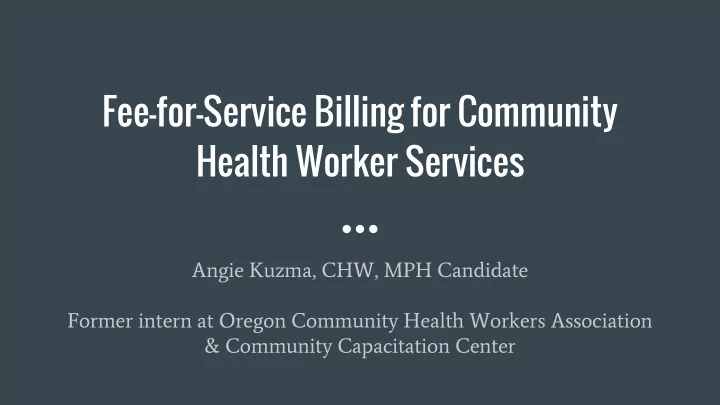

Fee-for-Service Billing for Community Health Worker Services Angie Kuzma, CHW, MPH Candidate Former intern at Oregon Community Health Workers Association & Community Capacitation Center
A little about me Master of Public Health graduate student at PSU CHW/navigator at Multnomah County Health Department HIV Health Services Center
I serve clients who are: People living with HIV/AIDS • Men who have sex with men & other LGBTQ-identified people • Refugees • People who experience homelessness & unstable housing • People who have mental health diagnosis(es) and/or substance use disorder • People who have other chronic health conditions as well as HIV/AIDS. •
Emphasis of Internship 1) Investigate CHW payment mechanisms Literature review • Payment mechanism matrix • Environmental scan • 2) Further develop CHW payment mechanisms CHW billing fee-for-service • Implementation at state and county levels •
What is a CHW Payment Mechanism? I offer a working definition: “The process by which funding from a particular source is administered to a specific CHW program.” Two key components: 1. Funding source 2. Funds actually make their way to CHW program somehow
Background HB 3650 (2011): -Oregon Health Authority applied for and was granted federal approval for use and reimbursement of THWs through Medicaid. -Form 3113 edited to include THWs. HB 3407 (2013): -Established THW Commission. -Training & education requirements for THWs. -CHW certification.
2017 Billing is not yet up and running for CHWs statewide.
Missing pieces ❏ Align the CHW scope of practice with medical billing codes. ❏ Set up fee schedule for Oregon Health Plan Open Card. ❏ Meet with Coordinated Care Organizations and invite them to participate with CHWs as providers in their networks.
Billing codes: Process Roxanne Mcanally and I identified some 200 codes to • examine. Current Procedural Terminology (CPT) • Health Care Common Procedure Coding System • (HCPCS) Workgroup formed from Systems Integration Subcommittee. • Workgroup sunsetted. •
Billing codes: Process • Collaboration with Jonique Dietzen, Certified Professional Coder, Multnomah County Health Department. Goal: find codes that may be appropriate and allowable for CHWs. We selected codes based on: CHW scope of practice. • Certified CHWs have a certification, not a license. •
Billing codes: Process Overlay potential CHW codes with the Oregon Health Plan (OHP) • Prioritized List of Health Services. Codes that are covered by OHP sent to Oregon Health Authority for • approval. Medicaid spending restrictions per Oregon’s State Plan (for Open Card): • Service must be rendered to an individual. • No groups/classes or community-level codes. • No housing or employment-related codes. •
Question: Is it a worthy cause to try to establish billing codes for CHWs? On one hand, On the other hand, ● Uncertainty ● Sense of job security ● Lots of work ● Further legitimize CHW profession in ● Will it pay off? the eyes of health systems
Point of uncertainty #1: Reimbursement is moving away from fee-for-service. With Alternative Payment Methodology (APM) and bundling, codes are almost old- fashioned and probably going away eventually. ● Doctors, nurses, etc. use ● CHWs, too, need a way to billing codes under APM. track their work. ● Billing codes are ● Payers want to see building blocks of exactly what services are APM. being rendered.
Point of uncertainty #2: The states that have successfully billed for CHW services were only able to use a small number of codes — not representative of the CHW scope of practice. ● Impossible to assign a ● Honor CHW work by code to every single showing that a handful of CHW service. CHW activities are reimbursable. ● CHWS ought to retain ● Medicaid programs vary freedom and flexibility. from state to state.
Point of uncertainty #3: Even if CHWs could bill for services, the revenue wouldn’t be enough money to fund their positions. ● True that billing revenue ● Billing revenue as one more alone would not be enough funding stream to have in to sustain a CHW program. our pocket. ● CHW programs are often ● Small cushion of funds supported by multiple funding without an expiration date. streams.
Point of uncertainty #4: Using billing codes could lead to the over-professionalization of CHWs. ● Impractical to attempt to ● Most clinic-based CHWs confine CHW services to a already document work in set of billing codes. electronic health record. ● Impossible to assign billing ● A new skill but not a change codes to every CHW service. to the core of the profession.
Point of uncertainty #5: How will billing benefit CHWs who don’t work in clinics? ● Resist dividing the CHW ● CHW would need ties to an profession based on work established clinic in order to site. bill. ● Strength in numbers. We ● CHW profession as a whole should work together for benefits from billing. shared goals.
Question: Is it a worthy cause to try to establish billing codes for CHWs?
The answer: Yes, billing is worthwhile. Billing codes are an imperfect CHW payment mechanism. • The perfect payment mechanism doesn’t exist (yet) • “We belong here.” • Claims data is the preferred language of payers. • Very important for CHW programs to able to “speak” this language. •
Next steps Set up fee schedule for OHP Open Card • Meet with CCOs; show them the codes; invite them to participate • Potential pilot project at Multnomah County Health Department to • test out the billing codes Payment Models Ad Hoc Committee • Identify point person within OHA to move the process along. •
Questions?
Recommend
More recommend